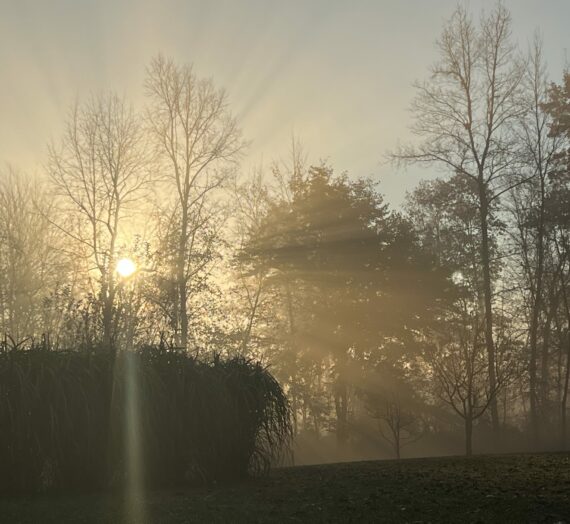Choosing Silence
My favorite times of silence are bike rides, running, hiking, kayaking, and mornings sitting outside. These times are not absent of sound, but they are peaceful and quiet.
When someone develops a discipline of silence, they learn to appreciate peace and quiet along with the benefits of regularl times of silence. These times involve reducing or eliminating unnatural sounds so natural sounds (e.g., breathing, birds, footsteps, wind, etc.) fill your awareness.
A discipline of silence means intentionally choosing not to bring noise into the equation. It means deciding to not talk, play music, or watch television. It means not introducing unnecessary sounds and instead existing in a quiet and peaceful place.
Realizing that the goal in a discipline of silence is really peace and quiet, not literal silence, helps understand how to achieve a true discipline of silence.
A discipline of silence allows you to think and process life. It’s creating a regular practice of simply existing with the natural sounds of life and involves thoughts being allowed to move freely with little outside influence.
Amplifying Silence
My own discipline of silence has developed into more of an active quiet rather than a true discipline of silence. My life exists at a slower pace and quieter volume than that of most people. Outside of TV time, which is relatively minimal, my house is generally quiet.
I spend much of my time in my office or kitchen or on my deck writing, researching, or studying, and I do so in relative quiet. I realized, though, that I am always doing something during quiet times. I live in quiet activity more than disciplined silence. Instead of just sitting and allowing my thoughts and my body to just be still, I am always doing something productive. In that, my own discipline of silence requires growth.
Instead of continually taking in and then regurgitating information, I need to spend time processing. I need to consider how the information I encounter fits into my life. More importantly, I need to weigh it against the Truth of God’s Word.
Amplifying silence means taking time to let life go and exist in stillness, so that God rather than the cares of life can fill and direct you.
“Be still and know (recognize, understand) that I am God. I will be exalted among the nations! I will be exalted in the earth.” (Psalm 46:10, AMP).
The depth of this verse’s meaning truly gets at the goal of a discipline of silence, especially when you read it in multiple versions and combine the words from each. For me, this activity led to a desire to:
- Deliberately choose to think and process life on a regular basis in as peaceful and as quiet of an atmosphere as possible.
- Just exist in stillness and let all else simply go on without me for a while.
As I intentionally live out the first half, I believe the second half of Psalm 46:10 will become more real in my life. God will become bigger in my life, and he will be glorified in my activity as well as in my silence.




cycleguy
My times of silence tend to be when I cycle as well Kari. I am almost always by myself (since my riding partner decided to take a hiatus from church, cycling, and me). What is really strange is even though I don't multi-task very well, and that includes praying or thinking while riding, I have some of my best ideas when my mind is not focusing on anything in specific.
Kari Scare
It's funny how we get so busy that we think productivity will be found in doing and going and accomplishing. As you and I are discussing, productivity is really found in letting go and just being. In that, by not focusing on anything specific for a while, we are able to get new ideas and to rework issues we're struggling with and to truly be productive in what we need to accomplish. It's in the times we can "be still and let be" that we find the fuel to do what we need to do in our non-quiet times.
Mary
I need quiet times in order to function. It is that simple. They may be while I am reading a devotional, or a blog, or the Word. They may be in bed while I meditate on a song or scripture. It may be while I am working around the house. I have come to like the quiet, to a point. If I had to just be still, not do anything, not have some thought running through my head I would struggle, and I do. I like the different versions. One that hit me was to "let go of your concerns". So easy to say, so hard to do. I had not thought of being still in that way, but I really like it. Thanks for sharing again about silence. You always have great things to think about.
Kari Scare
The different versions really do say a lot. Thanks for your comments, Mary!
Melanie Wilson
Kari, I have to confess to some envy. With six kids, a talkative husband (most of whom are home all day long), and a constant stream of visitors, quiet is hard to come by. I do, however, treasure my quiet time each morning for devotions.
A couple of issues from a psychologist's perspective. First is personality. For some personalities (like mine), being with people is restorative. I am refreshed and energized by interacting with people. Of course, I have to have some quiet time, too, but extroverted people need to talk. They don't need TV and the radio, however. Other personalities are drained by interacting with people and need to get away to recharge. Quiet is usually a requirement. I think you've mentioned before that you're of the latter persuasion.
The second issue is subconscious distress. There are a number of people who cannot stand the quiet because thinking is exactly what they do not want to do. Fear, hurt, anger, disturbing memories easily become conscious in the quiet. The noise blocks them. I suspect those who are arguing with you about whether quiet is possible are saying that they don't want it to be possible for them. Of course, this isn't always a serious concern. Often it's just a personality difference.
Interesting topic. Glad you two are writing about it.
Kari Scare
I definitely realize that personality plays a huge part in how much quiet a person needs. We have every personality type in my family, and we all need different amounts of quiet time. I am definitely an introvert and get drained being around noise/people. The physical distress point you make is also huge, and I really get that you have a much broader and more experienced perspective on this than I can offer. Two very good points, both of which I considered including but just didn't get to in the discussion. Wasn't sure how long I wanted to continue on this topic. There sure are a lot of facets to it. And actually, your second point is kind of any underlying point I wanted to make. I think perhaps developing a discipline of silence can be a part of the process of overcoming them. But again, I realize you are much more qualified to address that than I am. I just feel like having a discipline of silence, to whatever degree your personality and temperament needs, can help in the process of dealing with the junk of life. And dealing with it often needs to happen to have victory in it, especially if that dealing with involves the healing only Christ can bring. Or, perhaps, a discipline of silence can keep us from collecting more junk? You've got my thoughts going more on this topic, and I thought I was done with it.
Melanie Wilson
Kari, I hope you don’t think I was being critical by suggesting you should have included those issues. I just enjoyed giving my perspective. You have me an opening to do that–something I don’t do well as a blogger. I try to say it all. 🙂
I agree with you that it could be helpful to those with deep-seated psychological issues to include more quiet. But most likely they won’t unless they are desperate or have the help of a counselor or more likely both. Understand that I am not saying that God can’t change people, because He can and does. For some people, suggesting quiet time is like telling an agoraphobic to go to the shopping mall or a drug addict to stop using. Scary stuff. And often people can’t even pinpoint the source of the fear. They just know they hate the quiet. We typically assume that quiet time has to be alone time, but it doesn’t. Many people would benefit from quiet time with the reassuring presence of a loved one. In that environment, tears will often start. A loved one can help by saying that the distressed person will stop crying. It is a common fear that once someone begins crying they won’t stop. So they avoid situations that allow the tears.
Anyway, it’s a great topic that I’ve enjoyed chatting about. Aren’t you glad I’m not there in person talking your ear off? I would too, ya know. 😉
Kari Scare
Not at all, Melanie. In fact, I am truly enjoying the discussion. I would love more of this more often! In fact, one thing I do think you're wrong about is me not being glad you aren't here in person talking my ear off. I would actually love that! Thank you for mentioning that you felt given an opportunity for sharing your perspective. That is one of my goals in blogging, so it's great to hear confirmation of reaching that goal. Perhaps types and degrees of quiet time need discussed. Perhaps a post suggesting baby steps based on where a person is with regard to quiet time. Hadn't really thought of it that way before, probably because I'm so far on the other end of the spectrum. Hey, that's the word I was trying to think of.. spectrum. Something like the Spectrum of Silence. Not sure if it will happen on my end though, but we'll see where the Holy Spirit leads me on that. Again, terrific discussion.
Coach_Mike
Excellent thoughts…silence is more than absence of our words or noise, but truly a time to listen and reflect. God's messages most commonly come through quiet whispers rather than thunder and lightning. That is why so many of us miss the messages God has for us — we keep waiting for the loud audible message that never arrives.
Kari Scare
Thanks, Mike. My pastor said something Sunday that fits with your point. I may not have the words exactly right, but it was something like "We have so many different ways to hear God about God that we can't hear God."
rickd3352013
I love how this topic keeps putting down new roots and shooting off new branches 🙂
In doing the research that I did, I pulled from several faith traditions – including the monastic – to cover the ground, but I do not see anything in the teaching of any of the "mainstream" denominations that either supports or denies the need for silence (I like your term spectrum of silence – it fits better in our modern world). Lots of good stuff in these discussions!
Kari Scare
The idea of quiet time & just taking time to process life – to deal with it – seems to be what’s most crucial. Format seems less important. Though, I still firmly believe that everyone could benefit from regular quiet time without music, tv, etc. Also, I know there is research promoting the benefits of time in nature, which I feel can be the ultimate in quiet time.
Mark Allman
Lack of noise does not equate to silence in ones head. Sometimes it seems we are running after our thoughts trying to catch up to them to make them sit down and shut up. Once one has reduced the external noise one has to be as you say deliberate to turn down the noise and distractions in one's own heart. To be still and know that God is God I think one has to discipline themselves to fully concentrate on God and who He is and let Him sill our hearts as we do so. It is so important to take the focus off of us and place it on our Creator.
Kari Scare
Very true. And, I think it's what's going on in a person's head – or what could go on there – that people try to avoid by creating a noisy world. I also think it's so difficult to accomplish this discipline because our culture in general lacks discipline or the desire to discipline. We don't need it! You can have and do everything instantly if you want. We have to first become aware of the deficit of silence, then figure out steps to take to get more of it (based on personality, temperament, place in life, etc.), then take the steps. With a focus on God, who He is, and being still before Him, it's a discipline I think everyone can have to some degree.
Loren Pinilis
This may sound strange, but I think I enjoy a silence of the mind more when I have some gentle noise in the background. Something like waves or rain – it helps me to actually block out the auditory environment around me instead of getting distracted by a little creaking here or a car driving down the road a half mile away.
Kari Scare
I like natural sounds too. But I like variety in my silenslce as well. I want to be able to grab silence whenever & wherever.
Saturday Shortcuts | Planned Peasanthood
[…] to Victory | Amplifying Silence – Deliberately choosing to think and to process life on a regular basis in as peaceful and as […]
Caleb
I think sometimes we are afraid of silence, we are afraid of what things we might have to face if we were to stop and just think and process everything that is going on. My best times of silence are when I walk alone, this gives me great time to pray and listen and process.
Kari Scare
If you haven’t already, read Melanie’s comments on this post. He perspective based on her experience as a psychiatrist helps further understand the idea of having a fear of silence. Having a habit like you do is so essential in training ourselves in the discipline of silence.